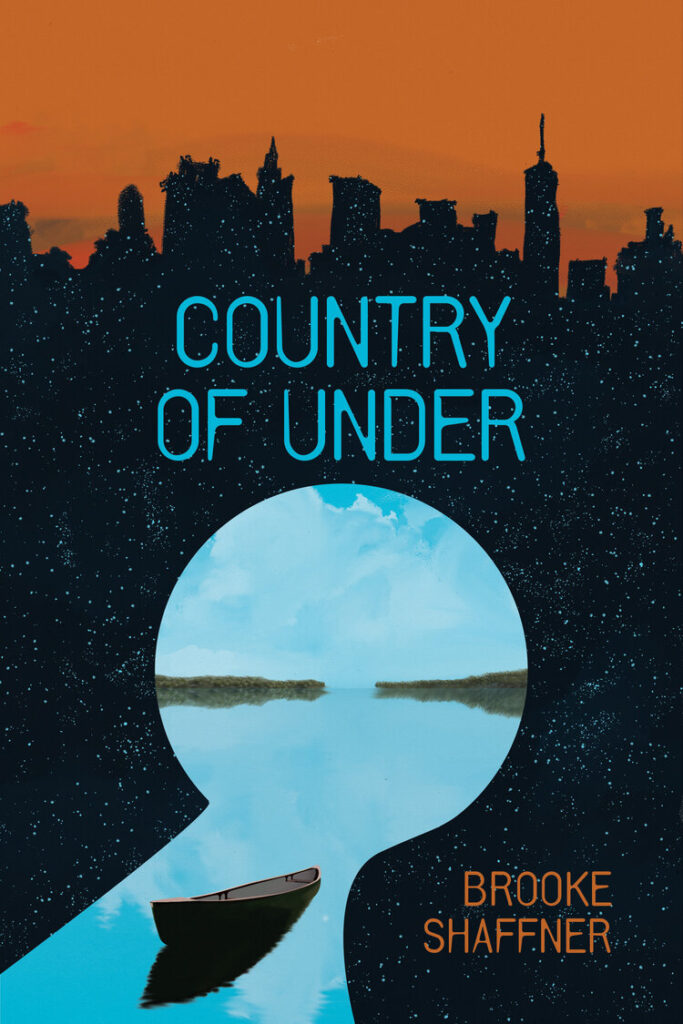
Mason Jar Press, 2024
Brooke Shaffner’s Country of Under tackles the social issues that shape identity and belonging. Immigration is the novel’s heartbeat, propelling its main characters, two misfit teens named Pilar and Río, into situations that ultimately help them to better understand themselves in relation to the immigration-related struggles that have shaped their lives.
The teens have everything in common: both are smart, motherless, and pinioned by undocumented immigration statuses. Bound by these similarities, they share a transformative friendship that persists even as they are drawn in separate directions. Quiet, isolated Pilar must contend with the immigrant legacies of her parents, while charismatic Río must carve their own path as a genderfluid DREAMer.
The story, which begins in a Texican border town in the Rio Grande Valley, alternates between their points of view. Immigration issues reveal themselves from the start. The undocumented status of Pilar’s father, Marin, restricts his access to basic necessities and causes him to live in a state of uncertainty. He must remain vigilant lest he be detected and deported, and he relies on Pilar to translate for him, as even other Spanish speakers struggle to understand his Bolivian accent. In short, their family’s precarity is acute. When Pilar gets into trouble for the first time in elementary school, she is scolded by her father:
’Mija, you can’t do that.’ He scanned the parking lot, lowered his voice. ‘I am illegal.’ She had to be good or he would be sent back to Bolivia. Pilar didn’t know what illegal meant but she knew it had to do with the fear and hiding.
Pilar’s absent mother—who may or may not be dead and who, if alive, may or may not be an activist leading refugees across the Rio Grande—also influences Pilar’s choices. Pilar eventually finds work teaching immigrant children at a convent near her college, and she helps asylum seekers, in whom she cannot help but see her father.
Charming and bold, Río is the opposite of Pilar, and his status as a DREAMer restricts him in different ways. They drive without a license, behind the wheel of a car they’ve named The Bitch. They avoid the guidance counselor, who wants to help with college applications, for fear of disappointment due to immigration status. They flirt with danger, driving close to the border but not daring to cross it. A theatrical star, Río delivers outstanding high school performances. But when they show up to the prom in a dress, an act of authenticity Pilar fully supports, they are met with bullying and violence.
To escape their parochial town, the pair studies hard, winning scholarships to distant colleges on opposite coasts of the US. Despite the distance, they support each other through the highs and lows of their first forays into adulthood—poetry readings and protest marches, academic triumphs and failed romances, drag cabarets, asylum trials, alternative medicines, and violent assaults. While Río embraces the freedoms and excitements of New York City, being a gender-fluid DREAMer impacts their life in large and small ways. Being in drag while using public transportation, Río is vulnerable to assaults. As a DREAMer, job opportunities are limited, and a path to citizenship is dishearteningly hard to secure.
In the book’s most poignant section, Río becomes part of a community of drag queens centered on a cabaret called Lucky Fengs. Through this community Río meets Dr. Yoon, a Korean immigrant who heals patients in different ways, by performing a special healing dance and by opening his acupuncture practice to the community around the cabaret. To Río specifically, Dr Yoon conveys this resonant message: “Rites of passage break with one life to create another, and often that break involves danger. But the danger’s circumscribed by rules and community that make order out of chaos. Sometimes people need to destroy an old self to create a new one.” Dr. Yoon’s advice is, in essence, what the novel illustrates, that everyone must take risks in order to become their best selves.
+++
Brooke Shaffner‘s work has appeared in The Hudson Review, Marie Claire, BOMB, Litmosphere: Journal of Charlotte Lit, Lost and Found: Stories from New York, and The Lit Pub. She has been awarded artist grants from United States Artists, MacDowell, the Ucross Foundation, the Saltonstall Foundation, the Edward Albee Foundation, the Jentel Foundation, the I-Park Foundation, and VCCA. She received her MFA from Columbia University, where she was a Dean’s Fellow. She teaches and edits through her company Between the Lines, and with her partner, Niteesh Elias, she founded Freedom Tunnel Press to publish books that straddle borders. Country of Under won the 1729 Book Prize in Prose.
+
Rosalia Scalia is the award-winning author of two story collections, Stumbling Toward Grace (Unsolicited Press, 2021) and Under the Radar, forthcoming in 2025 from the same publisher. Her fiction has appeared or is forthcoming in The Oklahoma Review, North Atlantic Review, Notre Dame Review, The Portland Review, and Quercus Review, among others. She holds an MA in writing from Johns Hopkins University and is a Maryland State Arts Council Independent Artist’s Award recipient. She lives in Baltimore City with her family.